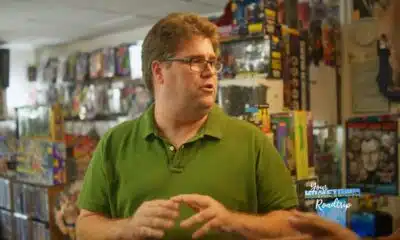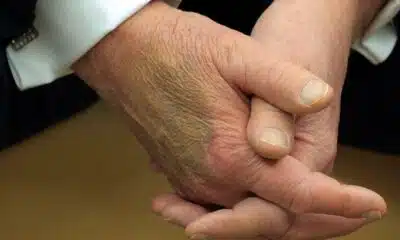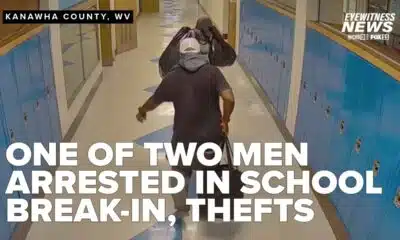News from the South - West Virginia News Feed
Morrisey’s line-item budget vetoes slash funds for vulnerable children during foster care crisis
by Amelia Ferrell Knisely, West Virginia Watch
April 18, 2025
Gov. Patrick Morrisey signed the budget bill Thursday night, but not before slashing millions of dollars in funding through his line-item veto power. The Republican governor’s cuts were wide sweeping across state programs, and services for vulnerable children were among those surprisingly hit.
“When I took office, I inherited a $400 million structural budget gap in the upcoming fiscal year, which would grow to nearly $600 million in the years ahead if it was not immediately addressed,” Morrisey said in a statement released by his office. “The fiscally conservative budget I signed tonight makes progress tackling structural gaps and begins to place us on a pathway toward financial stability in the future.”
The 29 separate line-item vetoes included slashes in funding for roads, school safety and tourism projects. There were also millions of dollars in cuts to programs that serve foster kids, families impacted by substance abuse and sick children.
Morrisey cut $250,000 in funding for Lily’s Place, a nonprofit organization in Cabell County that provides treatment for newborns with neonatal abstinence syndrome and support for families dealing with substance use disorder. West Virginia has the highest rate nationally of infants born with neonatal abstinence syndrome amid the state’s ongoing substance abuse crisis.
House Finance Chairman Vernon Criss, R-Wood, called it “the most insulting” of Morrisey’s line-item vetoes.
“This one should be right at the top — to be able to take newborns that are drug-afflicted and be able to help them,” Criss said. “[It] seems to have a very high success rate of helping newborns getting off the drug situation.”
Morrisey also decreased funding for the Ronald McDonald House in Morgantown and In-Home Family Education, a parent and child support program in West Virginia.
“It’s almost like you’re picking on kids who can’t speak up for themselves,” said House Minority Leader Sean Hornbuckle, D-Cabell.
The legislative session adjourned with little action on the state’s abundant foster care issues despite bills introduced to address a myriad of problems, including too many foster children living in hotels.
Lawmakers wanted to give $1.1 million in state funding to West Virginia’s Court Appointed Special Advocates, or CASA, a program that helps foster children in the court system.
Morrisey cut 75% of that funding in his line-item veto. His office did not respond to an email from West Virginia Watch seeking information about the funding decrease. In his veto message, the governor said the program relies on grants and could seek additional grant funding.
Shanna Gray, executive director of West Virginia CASA, said she was grateful to the Legislature for creating a dedicated line item for the program.
“We could not be more appreciative of our state lawmakers for prioritizing support for children in foster care,” she said. “Albeit significantly reduced, the governor‘s final allocation of $300,000 establishes a crucial foundation of state support. We remain optimistic about this initial investment and thankful for the state’s recognition of CASA’s essential role in ensuring children’s best interests are represented and heard.”
In total, Morrisey cut $800,000 in foster care funding.
“The fear is that we’ve got programs out there right now that we do not know if they’ll be able to continue because the federal dollars are going to dry up,” Criss said. “[Morrisey] needs to be able to take a very hard look at all the programs.”
In a news release on Friday, the West Virginia Democratic Party called on the governor to “reconsider these harmful decisions and focus state resources on supporting vulnerable citizens and vital community programs.”
Disagreement among GOP supermajority about budget
The Republican-led House and Senate passed their $5.3 billion general revenue budget bill last week.
Morrisey’s line-item veto messages used similar language often, saying, “it is imperative that a cautious and prudent approach be taken” while citing concerns about future uncertainties, like the federal stock market fluctuations and federal uncertainty. He also said that there are “ongoing budget challenges.”
The spending vetoes also included $500,000 reduction to Mountwood Park in Wood County for Jeep trails, and a $187,000 reduction to the more than $11 million allocation to the state Veterans Nursing home, and a $250,000 cut for a nursing education program.
“He decided nursing programs are not where he wants to spend money,” Criss said.
There was a $25 million reduction to the State Road Fund; Criss said that funding cuts may damage the state Division of Highways’ ability to draw down federal funds for projects.
Morrisey eliminated $250,000 allocated for the West Virginia University College of Law but did not touch the $1.5 million lawmakers gave the university to build a civics learning center overseen by a political appointee. Lawmakers passed a bill mandating the center, but it hasn’t yet been signed by the governor.
He slashed more than $110 million approved in three surplus funds, which included the funding for Lily’s Place. Morrisey said those funds may be needed for anticipated gaps in Medicaid, Public Employees Insurance Agency and federal changes.
Morrisey is a staunch supporter of President Donald Trump; Hornbuckle said the governor’s decision to slash state spending because concerns about Medicaid and federal changes showed, “Even the governor doesn’t believe his good friend is going to be able to help West Virginians.”
“We might have to fill back in dollars to Medicaid or PEIA,” Hornbuckle continued. “People need to be really paying attention to what’s going on there, and he doesn’t trust the Trump administration.”
Hornbuckle added that Morrisey’s line-item vetoes showed disagreement among the state’s GOP-supermajority in power.
Criss continues to refute Morrisey’s projected $400 million structural deficit.
“I am the last finance chairman still in place from the previous administration, I take that a personal cut,” he said. “[Morrisey] doesn’t understand how we have been budgeting and doing the budget process for the last seven years when we’ve tried to keep our ‘operating portion’ of our budget.” The House wanted the state to have surplus money in the back of the budget that could be used for one-time projects.
Senate Finance Chairman Jason Barrett, R-Berkeley, wasn’t available for comment.
Funds slashed for safe schools, educational programs
Morrisey’s line-item vetoes included several education-related projects, including funding decreasing to the Mountain State Digital Literacy Program, a math education program and computer science education. In a veto of $200,000 in funding for Safe Schools, Morrisey said it is, “imperative that we limit new spending.”
West Virginia’s public schools can’t afford to implement millions of dollars in safety upgrades, including secure front entries and weapon detection systems. There are more than $200 million in school safety requests in need of funding.
“How can we in good faith cut money to safe schools and that is something that goes to all of our public education when we are pumping millions of dollars into the Hope voucher program?” Hornbuckle said.
The budget passed by the Republican-led Legislature opted to put away about $33.6 million from general revenue to the state Personal Income Tax Reserve Fund. That money, Criss said, can be allocated by the Legislature at any time. The fund has more than $500 million in it, drawing frustration from Del. Kayla Young, D-Kanawha, during budget debate since other programs had gone unfunded.
The budget didn’t include $100,000 for clean drinking water in Wyoming County. Funding was cut for the state’s Jobs and Hope Program.
Hornbuckle voted against the budget when it passed the House, citing concerns about a lack of funding for child care.
“I didn’t think it had a lot of fiscal logic and appropriate the dollars that we do have to public education or child care,” he said. “I’m also confused why we went further down the hole right now in making the current cuts that we did.”
In a statement on Thursday, Morrisey said that “much work remains in the next fiscal year to address budget shortfalls.”
“ … I applaud the Legislature for sending me a budget that closely resembles my original proposal and begins to address long term issues while funding West Virginia priorities,” he said.
YOU MAKE OUR WORK POSSIBLE.
West Virginia Watch is part of States Newsroom, a nonprofit news network supported by grants and a coalition of donors as a 501c(3) public charity. West Virginia Watch maintains editorial independence. Contact Editor Leann Ray for questions: info@westvirginiawatch.com.
The post Morrisey’s line-item budget vetoes slash funds for vulnerable children during foster care crisis appeared first on westvirginiawatch.com
News from the South - West Virginia News Feed
Arrest made in school break-in, theft; another suspect still on the loose
SUMMARY: An arrest has been made in the Kanawha County school break-in and theft at East Bank Middle School. Mark Cameron Mullins, 36, was charged with grand larceny for stealing $6,500 worth of electronics, including laptops, a radio base station, and a tablet, on July 1st. Mullins was identified and reported by his own mother, who found stolen items in her garage. Held on a $100,000 cash bond, Mullins’ arrest followed public tips and social media-shared security footage. The school system plans to reuse the recovered equipment for students transitioning to a new school. Authorities are still seeking a second suspect seen in video footage.
One of the two suspects accused of breaking into East Bank Middle School and stealing several thousand dollars worth of items has been taken into custody.
_________________________________________
For the latest local and national news, visit our website: https://wchstv.com/
Sign up for our newsletter: https://wchstv.com/sign-up
Follow WCHS-TV on social media:
Facebook: https://www.facebook.com/eyewitnessnewscharleston/
Twitter: https://twitter.com/wchs8fox11
Instagram: https://www.instagram.com/wchs8fox11/
News from the South - West Virginia News Feed
Christian's Morning Forecast: Strong Storms and Flood Watches Persist
SUMMARY: Christian’s Morning Forecast: Strong Storms and Flood Watches Persist. A flood watch is in effect for all counties in the viewing area, with widespread storms expected today. Morning shows scattered showers mainly north near Durban and Huntington, with more storms arriving from Kentucky later. Highs reach 82°F, with western winds 5-10 mph and higher gusts during storms. There is a marginal risk of isolated severe storms, featuring high winds and flooding, especially in Nicholas, southern Koffields, and Taswell County. Rain totals over the next 48 hours will be around 0.75 to 1 inch, with heavier amounts locally. Rain and flooding concerns continue through the weekend before improving early next week.
FOLLOW US ON FACEBOOK AND TWITTER:
https://facebook.com/WOAYNewsWatch
https://twitter.com/WOAYNewsWatch
News from the South - West Virginia News Feed
Man accused of shooting at police who were trying to serve warrants in murder investigation
SUMMARY: Kanawha County deputies serving a warrant in a July 1 murder investigation were met with gunfire at an apartment in Saint Albans early morning. Eighteen-year-old Joel Magee fired multiple rounds from inside, striking both inside and outside the residence, which also housed a woman and a nine-year-old child. No one was injured. Deputies did not return fire, and Magee later surrendered. About 20 shell casings were found at the scene. Magee faces 13 counts of wanton endangerment, with more charges expected as the investigation continues. The shooting stemmed from a Charleston murder case.
A man is accused of firing several shots at West Virginia officers who were attempting to serve search and arrest warrants in a murder investigation.
_________________________________________
For the latest local and national news, visit our website: https://wchstv.com/
Sign up for our newsletter: https://wchstv.com/sign-up
Follow WCHS-TV on social media:
Facebook: https://www.facebook.com/eyewitnessnewscharleston/
Twitter: https://twitter.com/wchs8fox11
Instagram: https://www.instagram.com/wchs8fox11/
-
News from the South - Tennessee News Feed5 days ago
Bread sold at Walmart, Kroger stores in TN, KY recalled over undeclared tree nut
-
News from the South - Arkansas News Feed7 days ago
Man shot and killed in Benton County, near Rogers
-
News from the South - Georgia News Feed1 day ago
Aiken County family fleeing to Mexico due to Trump immigration policies
-
News from the South - Alabama News Feed6 days ago
Girls Hold Lemonade Stand for St. Jude Hospital | July 12, 2025 | News 19 at 10 p.m. – Weekend
-
News from the South - Georgia News Feed7 days ago
Anti-ICE demonstrators march to Beaufort County Sheriff's Office
-
News from the South - Oklahoma News Feed7 days ago
Police say couple had 50+ animals living in home
-
Mississippi Today4 days ago
Coast judge upholds secrecy in politically charged case. Media appeals ruling.
-
Mississippi Today1 day ago
Driver’s license office moves to downtown Jackson









































